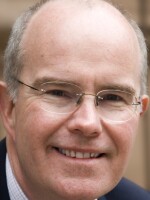WSHU is proud to have been selected as a Climate Beacon newsroom by the prestigious Solutions Journalism Network. Covering climate change—and how it affects those in our listening area around Long Island Sound—will be a primary focus of our reporting this year.
In the current media environment, it is often hard to discern fact from opinion. Over the past several years, and throughout the pandemic, the public’s acceptance of scientific fact has eroded. WSHU is working hard to re-instill trust in science. The reporting and features that WSHU provides you are fact-based and vetted. Our podcast “Higher Ground” was recognized by the National Academies of Science, Engineering and Medicine for Excellence in Science Communication.


What you’ll hear
As a Climate Beacon newsroom, WSHU will create a series of reports titled “Sound Science” which will focus on the global truth about climate change; combat misinformation about science; and center these stories around their impact to the coastal communities around the Long Island Sound. Why? More than 8 million people live in the Long Island Sound watershed and the activities that take place on and along the Sound – boating, fishing, tourism, and swimming – contribute an estimated $5.5 billion per year to the regional economy.
Reflecting on climate justice
In addition, WSHU Public Radio intends to deepen our climate change reporting to focus on its impact to BIPOC communities around the Long Island Sound and surrounding communities. Our specific goal is to establish a digital climate beat for residents of color, particularly in the African American and Hispanic communities in Bridgeport, CT, New Haven, CT, and areas of Suffolk County, Long Island.
According to an EPA Climate Change Report in 2021, racial minorities in the United States will
bear a disproportionate burden of the negative health and environmental impacts from climate change. The same report indicates that Black people are 40 percent more likely than other groups to currently live in places where extreme temperatures driven by climate change will result in higher mortality rates. In addition, they are 34 percent more likely to live in areas where childhood asthma diagnoses are likely to be exacerbated by climate change. These are weighty issues to report and seek solutions to help our communities improve.
As a Climate Beacon newsroom, we assume the responsibility to communicate verified, impartial, and accurate information in a culturally competent way to better engage our neighbors in public discourse that resonates. It is important to us that we become more culturally aware given the historic mistrust that has existed between communities of color, the media and scientific organizations.
These issues affect everyone around the Sound. The stories and solutions we hope to present will be of benefit and interest to everyone who lives here. And we want to engage with everyone. Please use the form below to tell us your concerns, your issues, and any possible solutions.
Thank you for listening,
Rima Dael, WSHU General Manager
Terry Sheridan, WSHU Senior Director of News and Education
_



